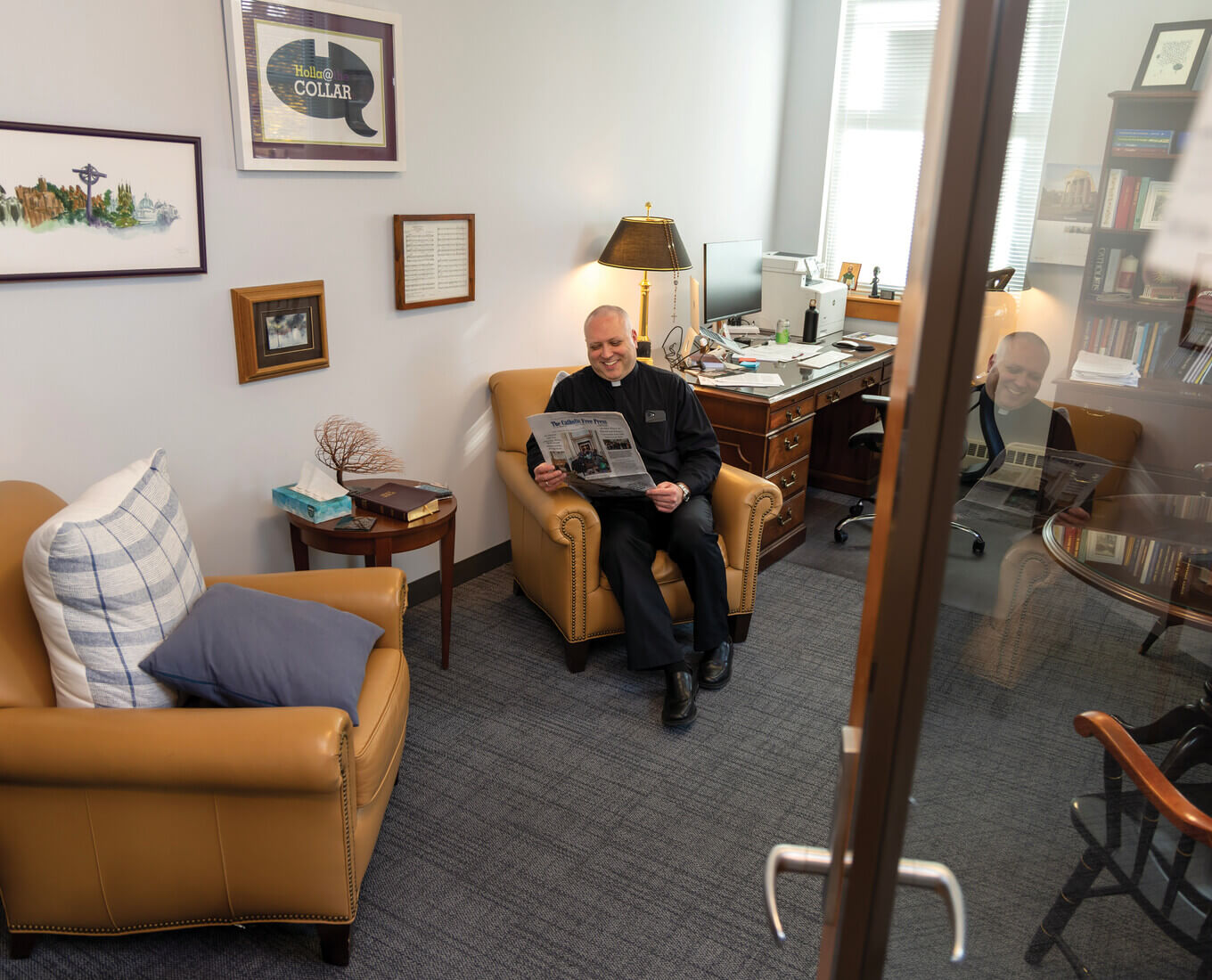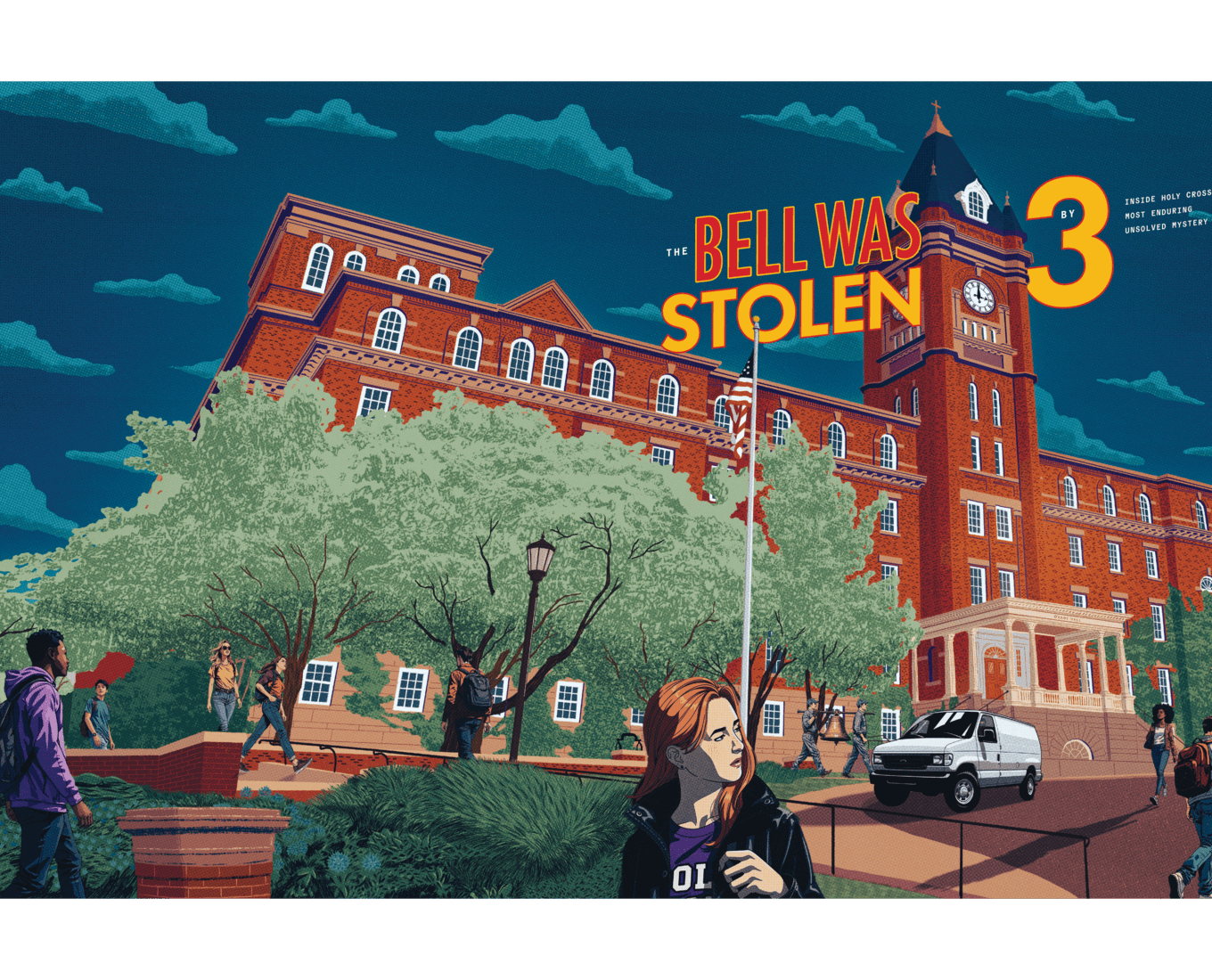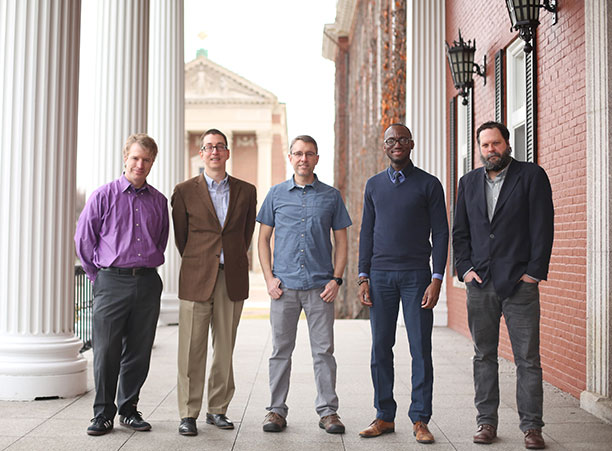 Six College of the Holy Cross faculty members in a diverse range of fields have been promoted to associate professor with tenure. From measuring the sociology of risk to creating the first-ever Digital Transgender Archive, these professors are pushing intellectual and academic boundaries. Hear from the newly tenured members of the faculty below.
Six College of the Holy Cross faculty members in a diverse range of fields have been promoted to associate professor with tenure. From measuring the sociology of risk to creating the first-ever Digital Transgender Archive, these professors are pushing intellectual and academic boundaries. Hear from the newly tenured members of the faculty below.
Daina Cheyenne Harvey, sociology
 Daina Harvey teaches his course "Food, Beer, and the Environment." Photo by Tom Rettig
Daina Harvey teaches his course "Food, Beer, and the Environment." Photo by Tom RettigWhat are you working on now? I’m working on four books: one on environmental citizenship, using the long-term aftermath of Hurricane Katrina as a case study; one with Ellis Jones on craft beer in New England; another book, edited by Ellis and me, on the micro-geographies of beer with a few other folks; and an edited volume with Melissa Weiner and colleagues on internal colonialism and the appropriation of wealth from non-white communities.
You've done significant research on craft beer and the environment. What's your favorite craft beer and why? That’s really tough because after interviewing the brewers you know their story and their beliefs, why they’re making beer the way they are and you want to root for them. My favorite beer style is wild ale — beers that are spontaneously fermented and usually taste tart/sour. But for breweries, right now, I’d drink anything from Proclamation in Warwick, Rhode Island.
André Isaacs '05, chemistry
 André Isaacs works in his lab with students. Photo by Tom Rettig
André Isaacs works in his lab with students. Photo by Tom RettigWhat are you working on now? My research program aims to develop new methods to rapidly access complex molecules that are of interest to the synthetic community, specifically those of biological relevance. Currently, my research group is working on developing a method to synthesize beta-lactams — an important structure in several classes of antibiotics — in a bid to address antimicrobial resistance, one of the major public health concerns of the current century.
Organic chemistry has a reputation for being the class that can break future med student dreams — why do you love it? How do you make other people love it? For me, organic chemistry is a really big puzzle and I love putting things together. I love it because it requires you to find creative ways of organizing a large amount of information. But most importantly, I love this course because of its relevance in our daily lives. When students make that connection and recognize that they are learning the actual tools used to synthesize compounds to better people's lives, it becomes a powerful experience and makes the material so much more exciting.
Justin McAlister, biology
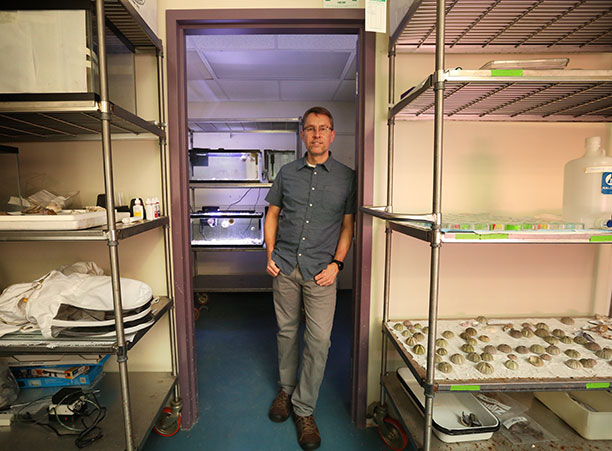 Justin McAlister stands in his lab among sea urchins. Photo by Tom Rettig
Justin McAlister stands in his lab among sea urchins. Photo by Tom RettigWhat are you working on now? I'm currently working on several research collaborations that broadly seek to understand the physiology, ecology, and evolution of marine invertebrates and their larvae. For a landlocked institution like Holy Cross, these collaborations allow me to keep my feet "wet," so to speak.
When and where did your marine interests begin? My grandfather was an avid fisherman and we would catch bait by encircling small "fry" (minnows) and squid with a long 50-foot net, one end of which I held onto while standing on the shoreline. My favorite part was always when we'd pull the net out of the water and then examine what we had caught. I was fascinated by the organisms, their different shapes and colors, and wanted to know who they were and how they went about their lives.
K.J. Rawson, English
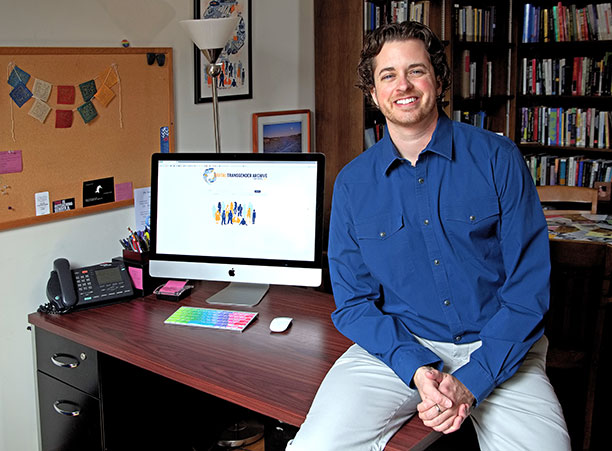 K.J. Rawson sits next to a screen displaying the Digital Transgender Archive. Photo by John Buckingham
K.J. Rawson sits next to a screen displaying the Digital Transgender Archive. Photo by John BuckinghamWhat are you working on now? The focus of my current work continues to be on the Digital Transgender Archive (DTA) and I am developing some scholarship based on materials in the collection. It’s wonderful to be in a place where I can now begin to study all of the amazing materials that are in the archive.
Where did the idea for creating the Digital Transgender Archive come from? Why do we need such a publicly available database? I began the DTA after I personally struggled to find primary source documents related to transgender history. Once I learned from archivists and other researchers that this was a widespread problem, I began to develop a research tool to make transgender history more accessible.
The DTA helps to educate those interested in transgender experiences throughout history and begins to address the sensationalizing coverage of transgender people in popular media. The project aims to elevate popular discourse related to transgender phenomena and allow for more accurate, nuanced, and complex accounts of transgender lives.
Do you have a favorite image or entry? That’s a difficult question! Right now, I am really loving this photography series taken between 1895–1903 by Marie Høeg and Bolette Berg in Norway. This photograph, in particular, I find incredibly striking.
Aaron Seider, classics
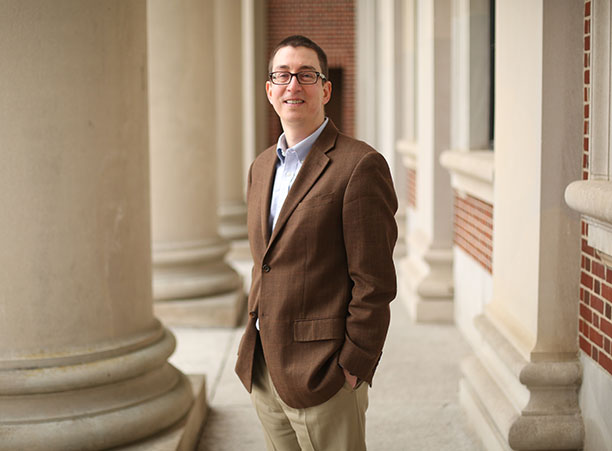 Aaron Seider. Photo by Tom Rettig
Aaron Seider. Photo by Tom RettigWhat are you working on now? My current project focuses on the relationship between gender and grief in Roman culture. I'm interested in exploring how men reacted to personal trauma, particularly given Roman society's expectations for emotional restraint. It's been exciting to discuss this topic with students in the classroom, where we've used modern reactions to loss (such as the Massachusetts Vietnam Veterans Memorial in Worcester) to reflect on our own and the ancients’ responses to trauma.
Why should students study classics? There are so many reasons! When we explore Greece and Rome, we study societies both similar to and different from our own, and the chance to discuss ancient thoughts about politics or the environment, for instance, prompts us to reflect on our own beliefs today. Moreover, I'm amazed by the imagination and rigor that characterize our students’ investigations of antiquity, and it's been singularly impressive to see our graduates carry this attitude onward in fields like law, politics, medicine, business, and education.
Kevin Walsh, computer science
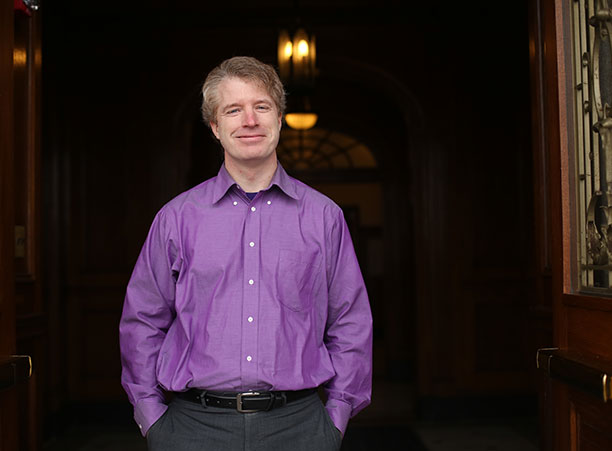 Kevin Walsh. Photo by Tom Rettig
Kevin Walsh. Photo by Tom RettigWhat are you working on now? My research focuses on the intersection of computer security and computer systems. For example, my most recent work with colleagues at Google and Northeastern University looks at how we can build more trustworthy software in cloud computing environments. Aside from my research, I am also working to improve software for teaching computer architecture.
The tech world changes in a nanosecond — what’s your view on how drastically the field is changing? Are more students gravitating toward computer science than even five years ago? In many ways, computer science as a field hasn’t changed much at all. But students need to understand and take control of the direction that technology is moving, otherwise someone else will. I’m glad to see that since I joined the faculty at Holy Cross, we have doubled the number of sections for most computer science courses, tripled the number of majors, doubled the number of minors, and overall enrollment in computer sciences courses has more than doubled.
As a computer scientist, can you think of an app that really stands out to you? One that really stands out is Google Earth. It represents a kind of openness and freedom — it lets us virtually visit almost anywhere on Earth, with no borders, no visas, and no restrictions. I can spend a weekend looking for unexplored ancient ruins in the deserts of Saudi Arabia, or monitor environmental changes over huge areas of land and sea.
